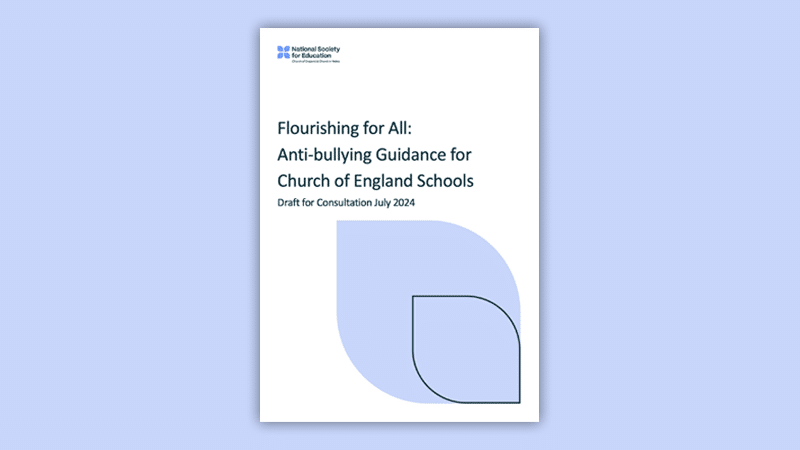Draft guidance on bullying for Church of England schools requires them to dispense with traditional language in favour of woke jargon.
Flourishing for All: Anti-bullying Guidance from the National Society, the Anglican education charity which advises CofE schools, urges teachers to embrace “up-to-date” language on ‘sexuality, sex and gender’ and says they “must challenge” the use of “outdated” terms.
There are 4,948 CofE schools in England with nearly 1.25 million pupils.
‘Up-to-date’ vocab
The document defines the term sex as ‘typically’ referring to “biological status as male/female but may refer to genetics, anatomy, physiology or legal status”.
Gender, it claims, is a ‘cultural construction’ to be “distinguished from biological sex”, and gender identity is said to be the “sense a person may have of their own gender”.
According to the Anglican charity, a transgender person is someone “whose gender identity is not the same as, or does not sit comfortably with, the sex they were assigned at birth”.
The society defines ‘Pronouns’ as, “The words we use to refer to people’s gender in conversation – for example, ‘he’ or ‘she’. Some people may prefer others to refer to them in gender neutral language and use pronouns such as they/their”.
Gagging order
To tackle “homophobic, biphobic and transphobic bullying” in schools, the guidance calls for gender-confused children and adults to be “kept safe from polarised debates” on gender ideology.
It explains: “Within the Church of England there is a wide spectrum of understanding about human sexuality and gender questioning, and within a school community many different views may be held too.
“It is acknowledged that this is a sensitive topic. However, this does not negate the absolute necessity to combat bullying of any type”. Clergy supporting the delivery of the curriculum are told to be “mindful” of the different “family groupings and relationships represented within the school community who should not be made to feel alienated, different or wrong”.
Teachers are encouraged to ensure all children are aware of “the positive contributions” made by LGBT+ figures in public life and history, and to include LGBT+ role models in the curriculum, but to remove any negative presentations of LGBT+ people from the curriculum.
‘Basic reality’
Criticising the pro-trans nature of the proposals, Family Education Trust’s Lucy Marsh said: “It is extremely concerning that the Church of England does not recognise that biological sex is immutable.
“Sex is not ‘assigned at birth’, it is determined at conception and recorded at birth. These are biological, unchangeable facts.”
Expressing similar concerns, Stephanie Davies-Arai – founder of the parent group Transgender Trend – commented: “Biological reality is not ‘outdated’, and it is worrying that the CofE thinks it is. Knowing that sex can’t be changed is not an old-fashioned idea, but basic reality.”
The consultation on the Church of England’s new guidance remains open until the end of July.
Government guidance
A Church of England spokesman, seeking to defend the guidance, argued that it is “informed by reputable existing sources, including Government Guidance, the Cass Review and the Church of England’s theologically informed Living in Love and Faith process”.
However, Department for Education (DfE) proposals to reform Relationships, Sex and Health Education state that gender identity is a “highly contested” subject which should not be taught. It also requires teachers, if asked, to explain to children the facts about “biological sex”.
DfE draft guidance on how schools should help gender-questioning children makes clear that: if a child wants to socially transition, schools should give “great weight” to parents’ views; in the vast majority of cases, teachers should use sex-based pronouns; and teachers and pupils should not be compelled to use a gender-confused child’s preferred pronouns.
The guidance was largely welcomed as a key step towards ending the trans-affirming agenda pushed on schools in recent years by lobby groups such as Stonewall. The consultation on this guidance has now closed, and the Government is expected to publish the final version in the near future.
Orthodox teaching abandoned
Last week, the Church of England’s national assembly – General Synod – decided to authorise the use of special prayers in standalone services that ‘celebrate and affirm’ same-sex relationships.
General Synod’s decision means it will soon be possible for churches to devote whole services “asking for God’s blessing for same-sex couples”. A trial of the services is expected to begin next year.
Revd Dr Ian Paul, a member of General Synod and the Archbishops’ Council, said: “It has now become clear and open that there are bishops who do not believe the doctrine of the Church and are determined that it should change.”
Following the vote, the Church of England Evangelical Council moved towards creating a new Province within the Anglican Communion, with pastoral oversight from bishops who remain faithful to orthodox teaching on marriage and sexual ethics.

Pro-LGBT groups call on Govt to abandon sex education guidance for schools
Wales urged to investigate national capture by trans ideology in light of Cass report
Canadian ten-year-olds taught about ‘people with a uterus’ instead of girls

